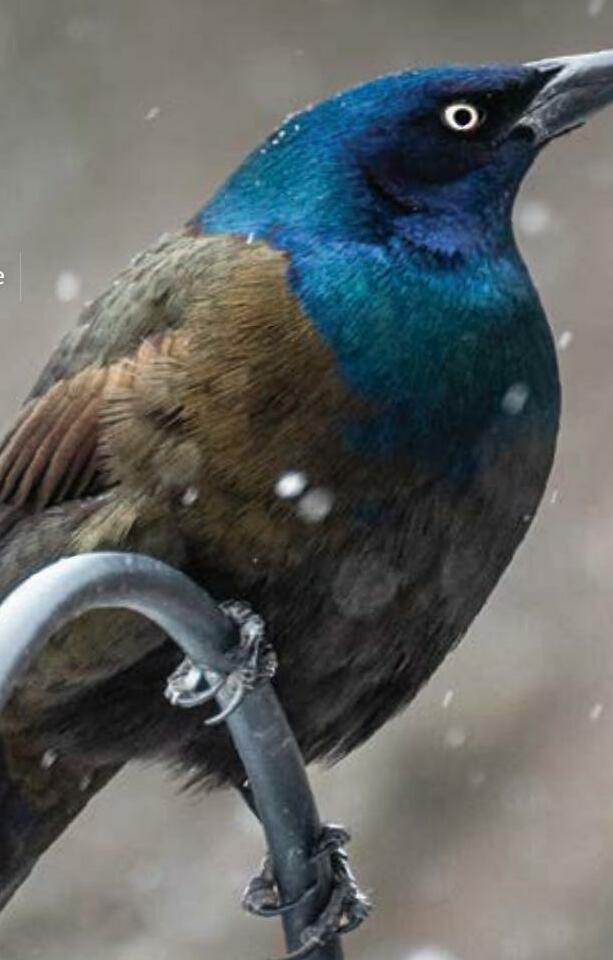
QA flock of grackles was devouring my suet, so I switched to an upside-down feeder. But now it seems as if no birds will eat from it. Woodpeckers have ignored it completely. What can I do to attract birds, especially woodpeckers, to the new feeder?
Erroll Jackson MARIETTA, GA
Kenn and Kimberly: Woodpeckers and other acrobatic species can easily access these upside-down feeders, but it can take a while for the birds to notice them and realize that the food is on the underside. One way to help them is to keep the feeder located where you want it, but rig it up with wires so that it's sideways, with the suet on the side instead of underneath. After birds find it, you can gradually shift its position until the food is on the underside again. Grackles may mob the feeder at first, but they should visit less often after it's returned to its upside-down position.
Q What's the white ring around this female cardinal's eyes? Is it frost or possibly a disease?
Holly Harnly MYERSTOWN, PA
Kenn and Kimberly: While a number of diseases can affect the eyes of wild birds, this doesn't look like any of the ones we know. (Admittedly, we do not have any training in bird diseases.) It looks like you took this photo in wintry conditions, with some snowflakes or sleet in the air and possible snow in the background, so we suspect this cardinal just has some snow or frost temporarily sticking to the feathers of her face.
Q We noticed these markings on a tree near our bird feeder. What could have done this?
John Spory BOSWELL, PA
Diese Geschichte stammt aus der December 2024/January 2025-Ausgabe von Birds & Blooms.
Starten Sie Ihre 7-tägige kostenlose Testversion von Magzter GOLD, um auf Tausende kuratierte Premium-Storys sowie über 8.000 Zeitschriften und Zeitungen zuzugreifen.
Bereits Abonnent ? Anmelden
Diese Geschichte stammt aus der December 2024/January 2025-Ausgabe von Birds & Blooms.
Starten Sie Ihre 7-tägige kostenlose Testversion von Magzter GOLD, um auf Tausende kuratierte Premium-Storys sowie über 8.000 Zeitschriften und Zeitungen zuzugreifen.
Bereits Abonnent? Anmelden

Basics of Hydroponics
Use these top tips and plant picks to have a successful soil-free garden

Rooted in Resilience
These hardy perennials will thrive in most zones
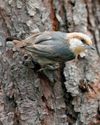
Social and Supportive
Brown-headed nuthatches take a helpful approach to raising their young
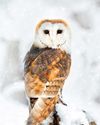
All About Owl Pellets
And why you should give a hoot about them

Ask the Experts
Advice from our pros about houseplants, bird feeding and more
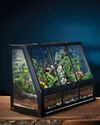
BRING THE OUTDOORS IN
Making a terrarium is about as close as you can get to a Zen DIY project. Once you have gathered the proper materials and squared away your plant selections, it's as simple as layering it all together and watching your mini ecosystem thrive. Here, I'll walk you through my foolproof process and cover all the required elements for good filtration, healthy soil, strong root growth and resistance against fungus and disease.

GROW THIS. NOT THAT
Six easy-to-grow houseplants—and six that may not be the right choice for you

Winter MAGIC
Forecasts may be frigid, but grab your binoculars because birding opportunities are still incredible
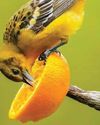
Sense or Nonsense? - Why some birds can taste and smell - but others can't
Does a porcelain berry taste like a blueberry to a gray catbird? Does a block of lard smell like frying bacon to a northern flicker? The short answer is no. While some avian species do have a well-adapted sense of taste or smell, they can't distinguish between flavors and odors the way humans can. They're not picking up every ingredient in the suet you put out, says José Ramírez-Garofalo, an ornithology researcher at Rutgers University in New Jersey and the director of Freshkills Biological Station in Staten Island, New York.

Maple Mania - Amazing facts about this fall foliage mainstay
Amazing facts about this fall foliage mainstay